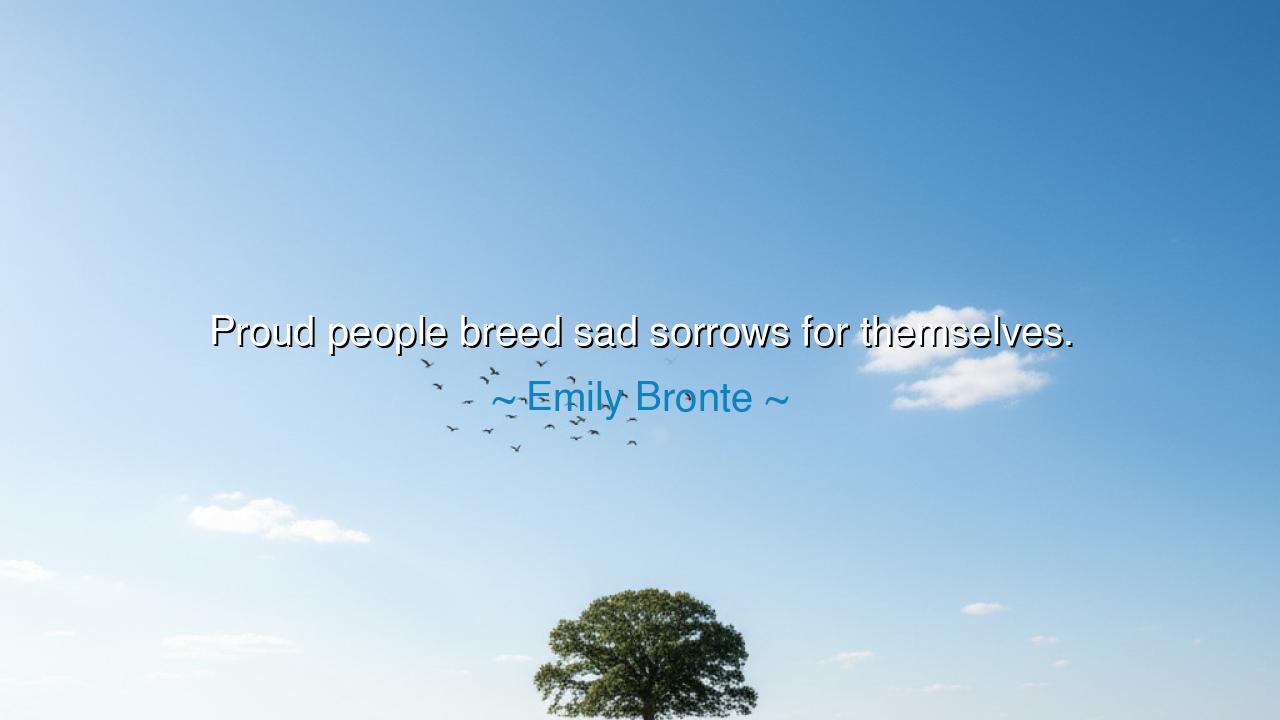
Proud people breed sad sorrows for themselves.






In the solemn and penetrating words of Emily Brontë, we find a truth both ancient and eternal: “Proud people breed sad sorrows for themselves.” This line, simple in form but vast in meaning, is a meditation on the destructive power of pride—that quiet and noble-looking seed that, when left unchecked, grows into isolation, regret, and ruin. Brontë, who understood the deep storms of the human soul, reveals here that pride is not a fortress but a prison; it does not shield the heart from pain, but multiplies it. The proud believe they are protecting themselves from humiliation or weakness, yet in doing so, they create their own sorrow, a sorrow that is both self-made and self-sustaining.
Emily Brontë, the reclusive genius of the Yorkshire moors, wrote this line within a world that knew both the cruelty of arrogance and the dignity of humility. Her own masterpiece, Wuthering Heights, stands as the living embodiment of this truth. The proud and tempestuous Heathcliff, driven by wounded pride, spends his life in vengeance, unable to forgive, unable to love freely. His pride turns his passion into poison, and in the end, he dies consumed by the very fire he refused to extinguish. It is the perfect illustration of Brontë’s wisdom: pride breeds sorrow, because it blinds the heart to grace.
The ancients, too, warned of this peril. In the myths of Greece, Narcissus fell in love with his own reflection, unable to see beyond himself, until his pride led him to wither beside the water’s edge. Oedipus, in his arrogance, defied prophecy and met the fate he sought to avoid. The Greeks named it hubris—the sin of pride against the gods—and taught that it was always followed by nemesis, divine retribution. Emily Brontë, in her own way, speaks the same truth, not as a myth, but as a human reality: when pride rules the heart, sorrow soon follows, for pride cannot coexist with love, nor can it bear the humility that brings peace.
History is filled with those who learned this lesson too late. Consider Napoleon Bonaparte, whose ambition and pride lifted him above kings, only to cast him down upon the desolate rock of St. Helena. His sorrow was not the work of his enemies alone—it was born of his own pride, which could not rest until it had consumed itself. Yet contrast this with Abraham Lincoln, whose humility made him great not through conquest, but through compassion. While pride isolates, humility unites. Pride says, I need no one. Humility says, We need each other. And therein lies the root of joy versus sorrow.
To say that “Proud people breed sad sorrows for themselves” is to say that pride creates a loneliness that no triumph can cure. It prevents forgiveness, closes the door to reconciliation, and turns even love into struggle. Pride keeps one from bending, but it also keeps one from blooming. The proud heart refuses to apologize, refuses to reach out, refuses to admit vulnerability—and so it grows cold. In protecting itself from pain, it cuts itself off from healing. The proud build walls to feel safe, but in the end, those walls become tombs.
From this truth, there emerges a sacred lesson: beware of pride when it disguises itself as strength. There is strength in confidence, yes, but pride twists that confidence into blindness. True strength is humble—it bows, it listens, it learns. If sorrow comes, let it not be the sorrow of stubbornness, but the sorrow of love bravely endured. If defeat comes, meet it with grace, not bitterness. The humble rise where the proud collapse, because humility keeps the heart open to the world’s mercy.
So, O listener, take these words of Emily Brontë to heart: guard not your pride as a treasure, but as a burden to be lightened. Let go of the need to be invincible; choose instead to be human. Admit fault, seek peace, and forgive quickly. In humility, there is freedom, and in pride, there is only grief. For the proud may win battles, but they lose the war within themselves. And in the quiet reckoning of the soul, it is not victory that endures—it is peace.






AAdministratorAdministrator
Welcome, honored guests. Please leave a comment, we will respond soon